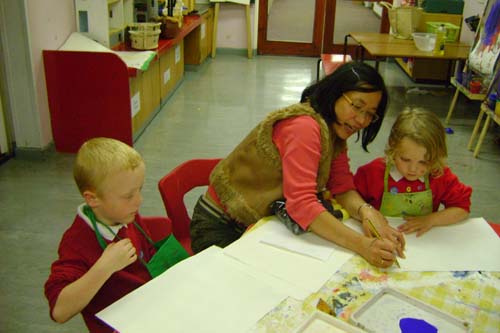Too much too young
Similar to many European countries, children in China do not start school until they are six or seven. Although this is relatively late in comparison to classrooms full of bewildered three year olds in Spain, China has been criticized for placing too heavy workloads on school children. According to a survey conducted by the Chinese Youth and Children Research Center (CYCRC), lengthy school hours and large amounts of homework are robbing children of their childhood. The CYCRC studied 2,500 primary and secondary schools throughout the major Chinese cities and found that because of the immense workload teachers and parents put children under in order to prepare them for the highly competitive university placement exams, many school children are too tired to play in the few hours of playtime they have each week. According to the study, children in China spend an average of 8.6 hours a day at school and often more than their parents spend at work. Exams are an integral part of the education system in China, the most important being the three day university placement exams, in which 10 million students nationwide nervously queue up on tenterhooks with their expectant parents at one of the 8,000 test centers available across the country.
The intense amount of pressure exams can bear on young shoulders is not confined to China, and was exposed in Britain by the Cambridge University led review, which was published last month. The investigation came as a nasty blow to the British government, referring to minister's as having "Stalinist overtones" for their interference and dictation over teachers on an "unprecedented scale". The study's contributors are appealing to the British government to scrap the exams at age 11 known as "Sats" and prolong the official starting age until six to relieve the damaging pressure England's young pupils face.
In spite the vast amount criticism both China and the UK have been under for their alleged Stalinist approaches in primary education, it has been albeit unacknowledged in the media that these two countries have embarked on a bilateral primary school program. A fresh, creative and fun exchange program has been set up and completely quashes the populist view (which was made especially popular since the Cambridge University report went public) that youngsters in England and China are damned to a lonely childhood with their heads permanently buried in a book. The scheme, in which many primary schools in England are participating in, enlightens pupils to the otherwise alien culture of the collaborating country.
Mrs Wee Wah, a teaching assistant in the UK and founder of "Chinese is fun", recognizes the importance of educating young children about Chinese culture and is involved in aiding this enlightenment in a primary school in South Manchester. So dedicated is Wee Wah to the cause, that she set up a group called "Chinese is fun", with a mission to make Chinese learning enjoyable to British schoolchildren. When asked about her feelings about the school starting ages of children, Wee Wah commented:
"I strongly believe that children should not start formal education too young. Six is an ideal age. Look at South East Asian countries, our children progress well academically (if not ahead of our Western counterparts). If children start too young, by the time they reach 16, they feel like they have had enough of education. Children should enjoy their childhood and spend more time with their families."
 |
| Wee wah's passion for teaching chinese culture is conventiently ignored in a damning indictment of British education. |
Whilst the critics are quick to condemn the teaching practices of countries like the UK and China for being "narrower than in the Victorian era", they are less hasty to include both the voice of the parents and what the exciting, culturally-enhancing and the priceless programs, like Wee Wah's "Chinese is fun", have on the lives of schoolchildren. Within the 14 authors, 66 research consultants and a 20-strong advisory committee at Cambridge University, where were the parents' opinions? Parents like myself, who are faced with dilemmas about whether to begin our child's school career three years earlier than the official starting age, in order to "conform to the normality'. If Frankie had the option of larking about dressed up as a Chinese dragon over being given a grade for being able to pronounce the word "dragon" correctly, I know which one I would choose.
 0 Comments
0 Comments







Comments